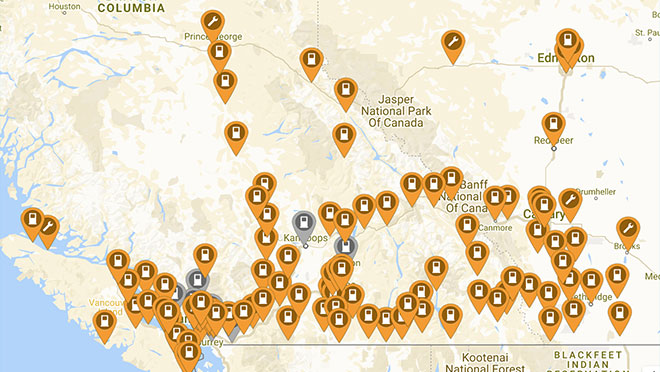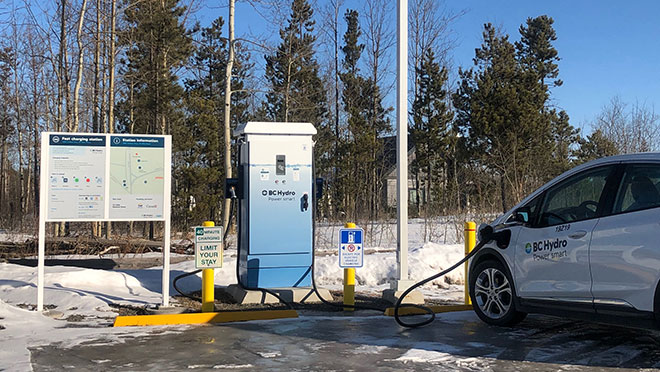8 things you should know about electric vehicles in B.C.

Rebates and charging network make B.C. the hottest EV market on the continent
If you're already driving an electric vehicle, or maybe just thinking about taking the "plug" into ownership, consider yourself lucky to be living in B.C. Not only are EVs here powered by clean and renewable BC Hydro electricity, an expanding charging network and tasty menu of EV rebates has made B.C. a haven for EV drivers.
It's not surprising that, per capita, more electric vehicles were sold in B.C. in 2019 – nearly one in 10 of all vehicles sold – than anywhere else in North America. And with more vehicle options and increasing range for all models, expect sales to increase significantly in 2020.
To give you a better idea of why there's so much excitement, here are eight things you should know about EVs in B.C.
1. It's getting easier to charge an EV outside urban centres
The bulk of BC Hydro's fast-charging network is in the southwest corner of the province – Vancouver Island and from Vancouver to the Rockies along Highway 1 and the Coquihalla – but EV owners are celebrating the network's expansion north. Later this spring, the opening of a two-charger station in Prince George will complete a loop of fast charging stations from Cache Creek to Prince George and back along the Yellowhead Highway to Kamloops. "Second stop here on quick return trip from Victoria to Prince George," posted a driver of a Tesla Model 3 on PlugShare.com while charging at the new BC Hydro station in Quesnel. "Great location for this charging station." There's now a fast-charger open at Port Hardy on the northern tip of Vancouver Island (and another opening soon at Port McNeill), helping bring BC Hydro's fast-charging network to more than 70, and the total number of fast-charger stations in B.C. to more than 250.
The best news? Funding is approved for the rollout of 16 new BC Hydro stations and 15 upgraded or twinned stations over the next year. Look for details on station locations in the coming months, and an updated stations map at the Vancouver International Auto Show.

2. As fast-chargers gain in popularity, etiquette is key
The EV community is remarkably supportive of one another, at least until a driver abuses their privilege and stays plugged into a fast-charging station for more than 40 minutes, the time it takes to charge most plug-ins to at least 80% of capacity. "We're starting to hear more cases of drivers leaving their cars plugged in for extended periods of time," says Ajay Parmar of BC Hydro's EV operations team. "We really want to emphasize to drivers that they should follow common courtesy and etiquette by spending a maximum of 40 minutes at a station, or until you're at 80%, and to check in and out on PlugShare." Parmar recognizes that BC Hydro's interim policy of allowing charging for free increases the potential of drivers overstaying their welcome, and reminds drivers of a fast-charging fact: after 80%, the charging rate slows considerably, and eventually to a trickle. Learn more about charging etiquette.
3. If you want to test drive an EV, register early, and consider the Vancouver Auto Show
There's a surging demand for electric vehicle test drives in B.C., and that can make it difficult to get behind the wheel of an EV. Some auto dealerships are less than enthusiastic about making test drives happen, in part because dealerships rely on vehicle service and maintenance for much of their business, and EVs require much less maintenance than gas-powered vehicles. Call ahead to schedule a test drive, and gently remind the dealership to have the vehicle fully charged for your arrival. Also consider test driving multiple vehicles available at the Vancouver International Auto Show, March 25-29 at the Vancouver Convention Centre, but expect that the drives will be popular, so register early. Learn more about test driving an EV.
4. If you're going to install a home charger, get it done before March 31
BC Hydro's top-up rebate on the Government of BC's up-to-$350 rebate for the purchase and installation of eligible Level 2 chargers for homes expires on March 31, 2020. That means that if you want to cash in on the doubling of the rebate to a maximum of $700, you'll need to get a charger installed now. Only after the charger is installed can you apply for the single-family home charger rebates, which offer up to a 50% rebate on purchase and installation costs to a maximum of $700 when the BC Hydro top-up rebate is included. Once the BC Hydro top-up disappears, the rebate will be back to the $350 maximum. Learn more about the home charger rebate, including the importance of purchasing a charger on the approved list, on our EV charger rebate page.
5. Not only Teslas have the ability to go 300 km-plus between charges
Tesla raised the bar on plug-in vehicle range and is watching it pay off with the Tesla Model 3's emergence as the highest-selling fully electric car in Canada. But other automakers are rising to the challenge, and there are now nine different models from six different automakers available in B.C. that have ranges of between 363 km and 539 km. There are also three SUVs in the mix – the Tesla Model X, Hyundai Kona electric and Kia Niro EV.
6. Not ready to go fully electric? Two dozen hybrids are available
B.C. boasts at least 24 hybrid options that offer the combination of electric and gas-power for the practicality most drivers crave. They range from the very small – the Mini Cooper SE Countryman – to SUVs and the Chrysler Pacifica PHEV van. They offer the best of both worlds, as most offer enough electric range – usually between 20 km and 30 km – to operate largely gas-free for city trips, and the ability to shift to gas power to extend range to 600 km, 700 km and beyond. A big seller on the list is the Toyota Prius Prime, which boasts 40 km of electric range and over 1,000 km of range once you switch to gas.
7. Thanks in part to the federal rebate, EVs are becoming affordable
While the tipping point at which the purchase price of electric vehicles is roughly the same as similar gas-powered vehicles is still a few years away, the gap is narrowing, and rebates continue to play a major role:
- When B.C.'s $3,000 rebate is combined with the $5,000 federal rebate, savings up to $8,000 are available for the purchase of eligible new battery electric vehicles.
- Hybrid plug-in rebates are available to a maximum of $4,000 when federal and provincial rebates are combined.
- If you're willing to scrap your old gas-powered vehicle (and you act quickly), B.C.'s limited number of SCRAP-IT incentives offer an additional $6,000 rebate when you take your old vehicle off the road and buy a new battery electric vehicle. There's also a SCRAP-IT rebate for the purchase of a used battery-electric vehicle of $3,000.
How popular are these rebates? Expect 2020 funding of the SCRAP-IT rebate to run out within a few months, and keep in mind that the $5,000 federal rebate launched last year burned through half its three-year funding in the first eight months.
When the provincial and federal rebates are combined ($8,000), there are now at least nine fully electric cars available for less than $40,000, including several whose base models can be purchased for less than $30,000 after rebates. The popular Toyota Prius Prime hybrid base model costs $29,000 after the $4,000 hybrid rebate is factored in.
8. Grocery shopping while charging emerges as the perfect match
There's a distinct trend in B.C. towards a practical way to use time wisely while getting your vehicle charged at a fast-charger: shopping. The three most popular BC Hydro fast-chargers in December were in Loblaws parking lots at Coquitlam East, Southeast Marine Drive in Vancouver, and in Richmond.
"Our partnership with Loblaws and its superstores has been really beneficial for them, because people are charging their cars while shopping," says BC Hydro's Parmar. "And the same thing is happening with Canadian Tire and gas stations, where people are shopping or grabbing something to eat while they wait."
Related: